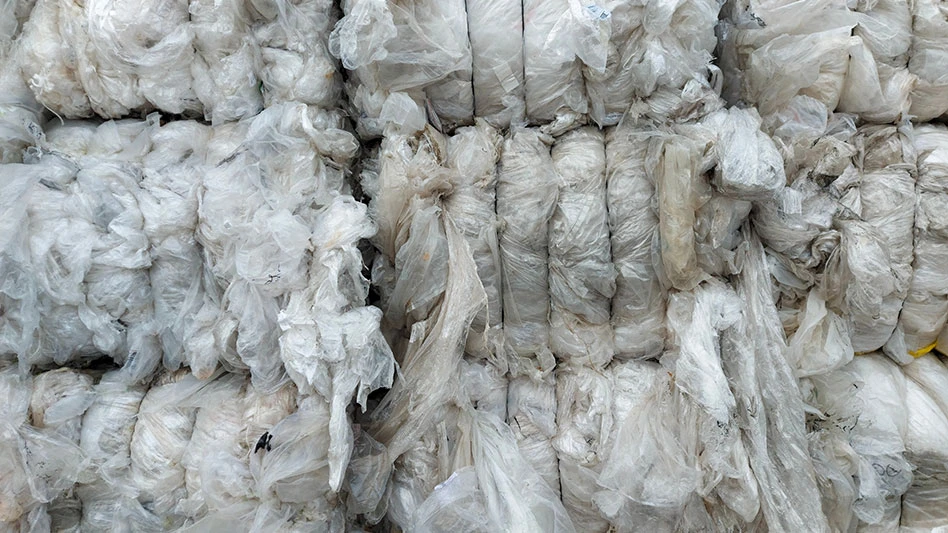
Sandris Veveris | stock.adobe.com
Hard-to-recycle plastic products are an industrywide issue that companies are grappling with at an increasing rate. With customers demanding sustainable options and new recycling regulations coming soon, companies need to band together for the greater good to help the industry move forward with a solution.
Stretch film is considered hard to recycle and, until recently, most manufacturers considered producing stretch film with recycled content too difficult. Why? First is logistics. Stretch film requires specialized recycling infrastructure, so it must be collected at drop-off points rather than curbside. This reduces the likelihood of postconsumer material being recovered, recycled and reintroduced into the market.

Second, North American recycling infrastructure struggles to efficiently collect, sort and process recyclables. In the case of stretch film, the number of recyclers who can process the material is insufficient. Stretch film manufacturers need quality postconsumer resin. Recycling infrastructure needs investment to increase capacity and collect more materials. Because companies do not typically pay a premium for recycled content, postconsumer resin (PCR) producers are struggling to expand their operations. We need to create greater demand for recycled plastics to prompt investment in infrastructure.
To address this, Veritiv purchased Attributes of Recycled Content (ARCs), certificates meant to fund investment in the recycling system through environmental commodity trading. The ARC trading system is similar to other environmental programs like carbon offsets and renewable energy certificates. ARCs are generated by recycling processors and reclaimers and are tied to new recycling investments. Each ARC certificate represents the environmental attributes associated with 1 metric ton of recycled output. The idea is that ARCs are a way to invest in infrastructure, helping recyclers increase capacity and creating more recycled content in the marketplace.
In 2023, Veritiv started working with Amsterdam-based ACT Commodities, the leading global provider of market-based sustainability solutions, to develop the first recycling project that generated ARC certificates under the GreenBlue/Recycled Material Standard (RMS). The transaction of certificates supported postconsumer polyethylene (PE) processing lines at Granite Peak Plastics—one of the first certified generators within the ARC trading system. Veritiv invests in ARCs with sales from its TUFflex Top Picks Stretch Film, and TUFflex machine-grade stretch film is the first to include up to 30 percent PCR. It was a breakthrough for the industry.
How ARCs benefit the recycling sector
Veritiv is again investing in ARCs before the end of this year. North American recycling infrastructure has significant problems that cannot be solved overnight; but, if one processor can increase capacity, that is more capacity than was available yesterday. Currently, ARCs are benefiting individual recycling plants. When more companies invest, more recyclers can expand. This program is new, but with time, the intent is to create systems and expand across North America. Many recyclers want to be included in this process. The benefit is clear.
To be eligible for ARC funding, recyclers must meet the business and financial requirements to be certified by RMS. In addition, the projects they request funding for must go above and beyond state mandates. For example, many recyclers request technological improvements, such as upgrading cleaning procedures and sorting processes (color and bottle cap sorting). The aimis to truly add infrastructure to help create more recycled content.
Like other commodities, this too will take time. Many corporations say, “We’ll get there” and “Recycling facilities take 15 years to build,” but we need a solution in the meantime. Like renewable energy, facilities are being built, but corporations also are making capital investments to fund these projects. Similarly, ARCs are a way to bridge that time gap and get to where we need to be with infrastructure by bringing in capital now.
Veritiv has seen success by helping Granite Peak Plastics, St. Louis, create an additional revenue stream to expand its processing capacity and increase postconsumer PE and polypropylene (PP) production within the U.S.
The next recycler to receive funding from Veritiv is a 50-year-old company in the Northeast that plans to improve the quality of products it provides. The company has a wide portfolio of polyethylene and polypropylene products and invests continuously in product customization, colors, Food and Drug Administration-approved compounds, and 100 percent PCR compounds.
The path forward
Impending regulations will generate demand, but that is causing a sense of analysis paralysis.
With extended producer responsibility (EPR) looming and manufacturers being held responsible for the environmental impact of product waste they introduce to the market, companies will be encouraged to design more sustainable products and processes.
Companies will need more recycled materials to include in their products, but the infrastructure is not there. Instead of doing nothing and waiting, one immediate answer for companies is to invest in infrastructure, and one way to do that is ARCs.
Latest from Recycling Today
- UK’s Renewi targeted by Macquarie Infrastructure
- Hydro cites recycling as 2024 growth driver
- The impacts of the nation’s first textiles EPR law
- Smurfit Westrock launches new packaging to address EU regulation
- ArcelorMittal wins legal round in GFG dispute
- Real Alloys partners with Enviri on residuals diversion project
- Registration Now Open for C&D World 2025
- The Scrap Show: Johnnie Jr., Roger and Marcie Rodriguez, Comal Iron & Metals





